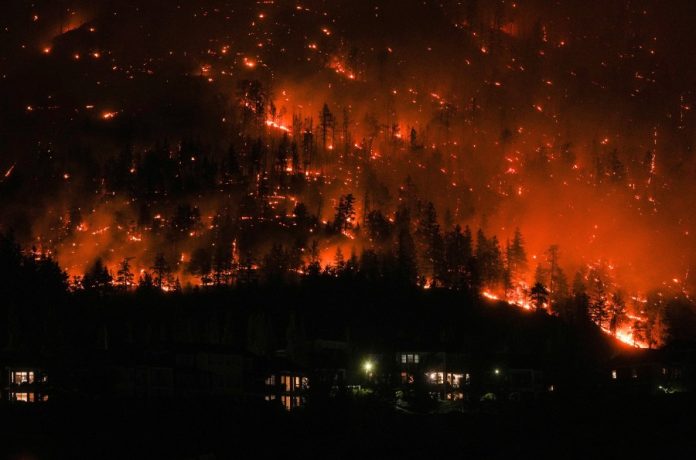
The United States and Canada endured the planet’s biggest air pollution surge in 2023 — an upswing driven by the northern neighbor’s worst wildfire season on record, a new report has found.
Canada alone experienced its highest levels of fine particulate pollution (PM 2.5) in at least 26 years, with more than half of residents exposed to contaminant concentrations that surpassed national standards, according to the report.
The data, released as an annual update to the University of Chicago’s Air Quality Life Index, showed that if these levels persist, people’s lives could be cut short by more than two years, relative to air quality conditions that met World Health Organization guidelines.
“When fossil fuels are burned, they cause particulate air pollution right away,” Michael Greenstone, an economics professor at the University of Chicago’s Energy Policy Institute and co-creator of the index, said in a statement.
“There are more wildfires because fossil fuels also lead to higher temperatures, and the result is a second wave of air pollution,” he added.
As for the U.S., Greenstone and his colleagues determined that the fires contributed amounts of air pollution that the country had not seen in more than a decade. Compared to just the year before, particulate pollution levels rose nationwide by an average of 20 percent, per the data.
The resultant pollution from the Canadian blazes spread across Wisconsin, Illinois, Indian and Ohio and even reached as far as Pennsylvania, Oklahoma and Mississippi, the report showed. Counties in these states, the authors found, replaced many in California as the top-10 national pollution hotspots for the first time in five years.
“We are now stuck living with air pollution concentrations that are the dangerous ghost of the fossil fuels burned since the Industrial Revolution,” Greenstone said.
Worldwide, the index determined that air pollution exhibited a slight increase in 2023. If the planet was to permanently reduce particulate pollution to meet global health guidelines, the average person could count on an additional 1.9 years in life expectancy, according to the report.
“Even countries that have earnestly spent decades cleaning up their air can’t escape these ghosts and the shorter and sicker lives that they deliver,” Greenstone added.
Characterizing particulate pollution as “the world’s greatest external risk to human health,” the authors stressed that its impacts on life expectancy are comparable to those of smoking, more than four times those of high alcohol consumption, five times those of transport injuries and six times those of HIV/AIDS.
But the researchers also said that not all hope is lost, and that people can benefit from gaining awareness about the quality of the air they breathe via increasingly available data sources. And yet, almost 70 percent of the global populations lives in areas that lack sufficient access to such information, the authors said.
Tanushree Ganguly, director of the Air Quality Life Index, recognized in a statement air pollution’s role as “a top reason why people are living shorter lives throughout the world.” As such, he stressed the importance of embracing tools that enable better policymaking and provide more information about the pollutants people are breathing.
“Throughout history, countries have both grown and developed and improved their air quality,” Ganguly said. “Targeting fossil fuels at their sources will improve local air, as well as help confront climate change.”

